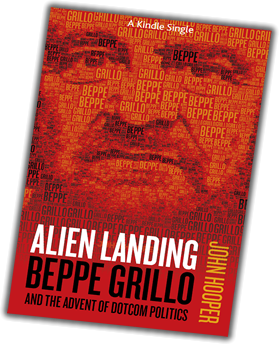
| amazon.co.uk | amazon.com |
In September 2012 I was preparing an article for the Economist on the Five Star Movement (M5S). Having failed to make contact with Beppe Grillo, I decided — without much hope of success — to try my luck with the Movement’s infinitely more retiring co-founder, Gianroberto Casaleggio. I rang his office in Milan and to my surprise he came on the line and agreed to talk.
By then, I had been struck by the gaping disparity between the M5S’s poll ratings (which at one point had put it in second place, ahead of even Silvio Berlusconi’s Freedom People party) and the negligible attention being paid to it by mainstream politicians and traditional media. It was as if they hoped it would go away if they refused to talk about it.
As it happened, the Movement’s popularity had dipped in the preceding few weeks and the headline eventually put on my story was “A waning star?” How wrong can you be? In the months leading to Italy’s general election, support for the M5S ebbed and flowed. But it became increasingly clear that it would not go back to a trickle and might just turn into a flood. In December, I suggested to the Guardian that I put in a bid for an on-the-record interview with Casaleggio, which turned out to be the first he had ever given to a newspaper.
It was during the hour or more I spent with him in his offices that I began to grasp that the Five Star Movement was not just a protest movement feeding off opposition to globalisation, like Occupy Wall Street, or anger at the austerity measures imposed on southern Europe, like Syriza in Greece. Its aim was vastly more ambitious – it was not about political reform or even revolution, but changing the very nature of politics to adapt it to a new, digital reality.
Utopian? Perhaps. But the M5S is nothing if not a novelty: a ‘non-party’ with a ‘non-statute’ owned by a comedian with its headquarters on a website. And since my business is news, it was an irresistible subject for longer treatment than I could give it in a newspaper or a magazine.

